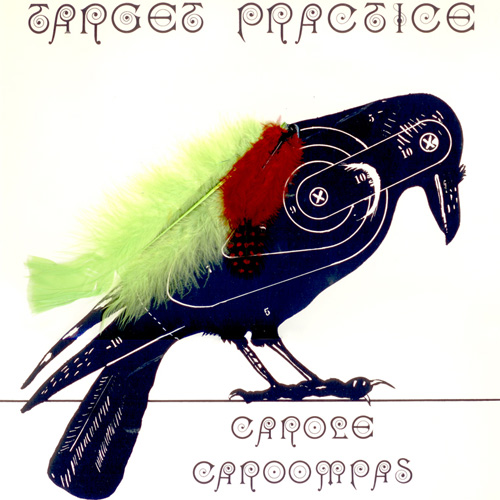

Carole Caroompas was already an established painter when she began devising performances to compliment her visual art, mostly paintings full of text and collage. Caroompas was an attractive young woman with a buttery, real voice, and one gets the sense that performance would have figured into her career with or without the burgeoning scene happening around her.
Target Practice is a cycle of eight songs first performed by Caroompas late 1981 at the Los Angeles Institute of Contemporary Art, and again at various galleries over the following year. Standing in front of an elaborate wall full of diagrammatic images and text that resembled one of her paintings blown up to wall size, Caroompas would sing along to a prerecorded soundtrack of Casio notes, metronomes and handclaps, found sounds, and multiple tracks of her own voice. Caroompas wore a black dress with a pearl necklace– demure above leopard print high heel boots. Without a stage to look down from and no microphone to amplify her voice, she would captivate audiences with an mix of song and spoken interludes about the history of archery and the scientific discoveries of Archimedes. Owing to space restrictions, the interludes were not included on the album of the show, which ran over an hour in length. Each song begins with the sound of arrows hitting a target, one after another. It’s not pop music.
Caroompas produced 250 copies of the album with silkscreened covers and paste-on colored feathers. The songs are mostly about relationships, desire, power, bad boys, and communication or lack thereof. Actually, only one track — ‘Bedroom Eyes’ — really sounds like what we think of as a song; the rest are more like chants, often in the flippant vernacular of new wave kids. Carole will kill me for saying this, but it’s almost as if the 70s Joni Mitchell SSW (singer-songwriter) tradition crash landed in the LA art scene, and the all the strange effects and sarcastic putdowns are cover for the more personal, conventional thrust of the work. In my favorite track, ‘The Baby-Classic,’ Caroompas directly, beautifully confronts her disappointments as a woman / artist / lover:
I had great expectations about almost everything (1234)
And I had high ideals for almost anything (1234)
And I thought things could be perfect once you paid your dues (1234)
But most of all, I had great expectations about you (1234).
Caroompas creatively finds entertaining new ways to tell old stories about romantic life in the big city. The album is sincere and funny, and never too hip for its own good. It’s hard not to like a record that starts with the artist telling the leering men who harass her on her way to her studio on Hollywood Boulevard: “Eat shit and die, you leaky dick.”
— Douglas Mcgowan, September, 2008